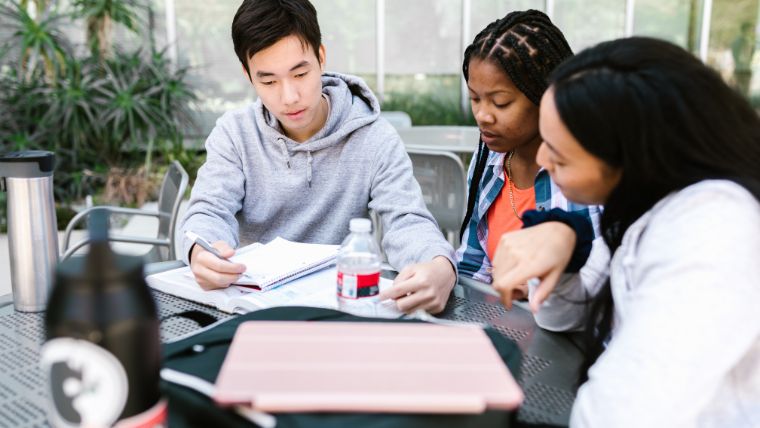Every student is unique and has his or her own preferred learning style. However, there are certain essential study skills for students that need to be mastered in order to be successful in school.
The key word here is skills.
Studying is a skill you can build, not something you’re born with.
And just like playing the piano or cooking a meal, it can be learned and mastered with practice.
Some of the key skills that go into developing effective study habits include focus, organization, time management, and problem-solving.
These skills can be learned and honed with practice so that they become second nature when it comes to studying for tests or completing homework assignments.
Having the right set of study skills will make all the difference in a student’s success in school, so it’s important to work on developing and refining these skills throughout the academic journey.
There’s tons of research out there on the most effective study methods and learning styles. However, every student is different and what works for one may not work for another.
The best way to figure out what works best for you is to experiment with different techniques and find what helps you learn and remember information better. You might also consider taking an online course, like International Open Academy’s “Supersonic Study Skills” class that will help you learn the fundamentals of effective studying.
 Supersonic Study Skills | International Open Academy
Supersonic Study Skills | International Open Academy
Tired of studying for hours and not seeing results? With this powerful online course from International Open Academy, world-memory champion Yanjaa Wintersoul will teach you her proven methodology for highly effective studying, with tips that help with everything from time management and overcoming procrastination to memorization techniques.
In the guide below, we’ll outline 9 essential study skills for students that can help you succeed in school.
The Most Important Study Skills & Tips
1. Ask questions
Just reading over a bunch of material and hoping to remember it all is not an effective study strategy. You need to be actively engaged in the learning process by asking questions and thinking about what you are reading.
You should always be asking why things work the way they do, how things are related to one another, and what the main points of the text are.
If you don’t understand something, ask your teacher or a fellow student for clarification.
The more questions you ask, the better you will understand and retain the material.
2. Create a study schedule
One of the most important study skills for students is to develop a study schedule and stick to it.
Sit down at the beginning of each week and map out when you will study for each subject. Make sure to schedule breaks so that you don’t get overwhelmed or burnout. And make sure you’re scheduling your study sessions for a time when you’re going to be alert and away from any distractions.
And try to stick to the same general routine each day so that your brain knows it’s time to focus on learning.
3. Take better notes
If you think about it, the studying process really begins in the classroom when the teacher is lecturing.
It’s important to take good notes that capture the main ideas and supporting details of the lecture.
Use a note-taking system that works for you – whether it’s bullet points, mind maps, or full sentences. You might even find using a note taking app is helpful.
The main thing is when you’re taking notes in class, make sure they are neat and organized in a way that you can use them later on when you study.
And don’t be afraid to go back and edit your class notes after class to fill in any gaps, that’s a key part of the note taking process.
4. Explain what you’re studying out loud
One of the most effective ways to learn something is to explain it to someone else.
When you’re studying for a test, try explaining the course materials out loud to yourself or a friend.
You can even do this when reading through a textbook or your notes. Stop after every chapter or key point and explain in your own words what you just read.
This will help to solidify the material in your mind and also catch any errors in your understanding.
5. Make studying an ongoing habit
Studying isn’t something reserved just for the days leading up to an exam.
If you want to really master the material, you need to make studying a regular habit. You should basically always be in some part of the study cycle, even if you don’t have a test imminent.
Set aside some time each day or every other day, even if it’s just 10-15 minutes, to review what you’ve learned recently.
This will help keep the material fresh in your mind and prevent you from forgetting it.
6. Avoid marathon study sessions
While it’s important to make studying a regular habit, you should avoid marathon study sessions right before an exam.
Cramming everything in at the last minute before a big test is not an effective way to learn and will likely just lead to stress and anxiety.
You’re better off spreading out your studying in short bursts over a longer period of time so that you can really focus and retain the information.
In general, you shouldn’t study for more than an hour at a time without taking a break.
In other words, it’s about studying smarter, not harder. Slow and steady wins the race.
7. Take practice quizzes
One of the best ways to prepare for a test is to take some practice quizzes.
You can find practice quizzes online, in study guides, or even in some textbooks.
Taking these quizzes will help you identify any areas where you need to focus your studying.
And when it comes time to take the actual test, you’ll feel more confident and prepared.
Can’t find a practice quiz? Create your own practice tests as you’re studying by coming up with questions related to the material.
This exercise will help you to both understand and retain the material.
8. Identify your weak areas
One of the most important study skills for students to master is having the ability to identify your weak areas.
Oftentimes, students will avoid studying the topics they’re struggling with because it’s frustrating.
But if you don’t face your weaknesses head-on, you’ll never improve.
So take some time to assess what areas you need to work on and make a plan for how you’re going to address them.
9. Create a study guide
A study guide is a great way to organize your thoughts and focus your studying.
Start by creating a list of all the topics you need to review.
Then, for each topic, create a bullet point list of key concepts or ideas.
You can also include practice questions, flashcards, or sample problems.
Creating a study guide will help you feel more prepared and confident going into an exam. It will also help you have a more productive and more focused study session each time you sit down to review. Plus, you can refer to your study guide anytime during the semester for a refresher on any topics or concepts.
A Final Word on Study Skills for Students
Knowing how to study the right way is essential for any student who wants to be successful.
But it’s also important to keep in mind that there is no one-size-fits-all approach to studying.
The study method that works for one person might not work for another.
So experiment with different techniques and find the ones that work best for you. This will help you optimize your personal approach to studying over time.
And don’t be afraid to ask for help if you’re struggling.
There are plenty of resources available, both in-person and online, that can help you master the material and ace your exams.
The main thing is consistency once you find the study strategies that best fit your learning style. By putting in focused, efficient study time on a regular basis, you can always stay prepared for anything that might come up.
Have you mastered these study skills for students? Share your thoughts by commenting below
- Elevating Your Virtual Presence: Why EMEET’s SmartCam S800 Stands Out in Modern Communication - 06/04/2025
- US Teachers Will Spend $3.35 Billion of Their Own Money on Classroom Expenses in 2025-25 School Year - 06/04/2025
- Report: Leveraging AI Tools Could Help US Teachers Avoid $43.4 Billion of Unpaid Overtime Work - 06/04/2025



